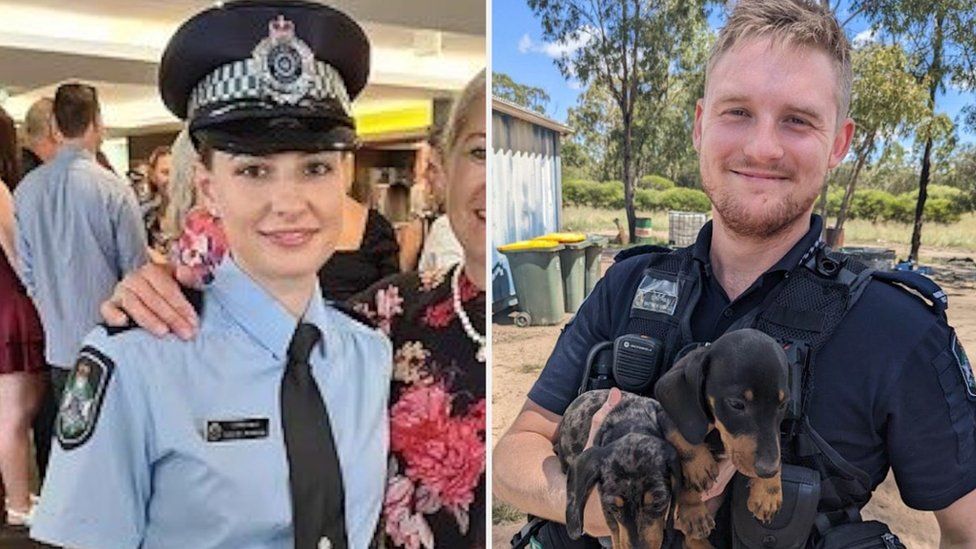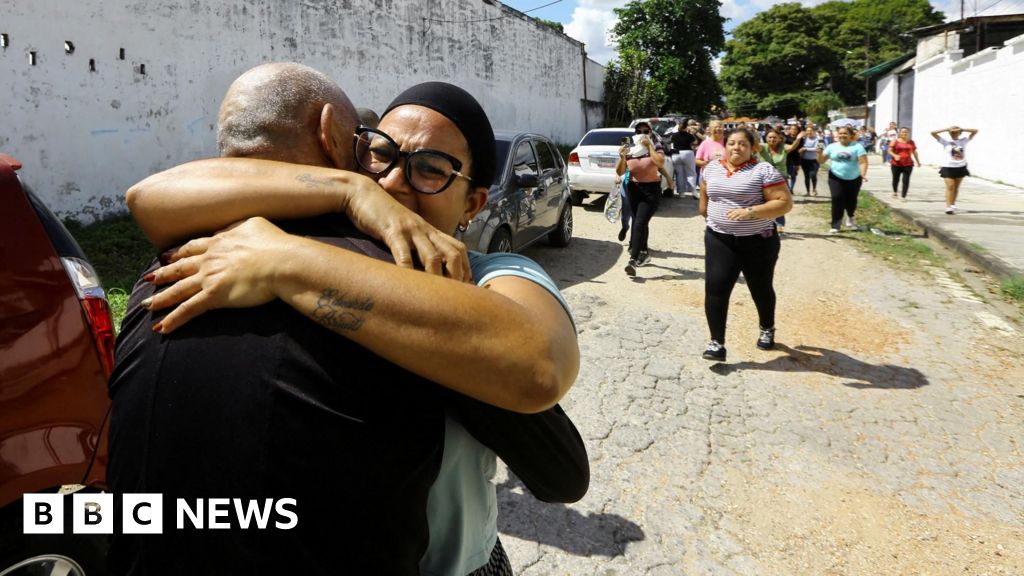ARTICLE AD BOX
 Image source, Queensland Police
Image source, Queensland Police
Matthew Arnold and Rachel McCrow had trained together, and lived together in police housing
By Tiffanie Turnbull
BBC News, Sydney
About 16:30 local time on Monday, four junior police officers went for a routine visit to a rural property in a remote Australian area called Wieambilla.
Within hours six people would be dead.
Two officers were shot and killed, as was a concerned neighbour, before a long siege ended with specialist police fatally shooting three suspects.
As Australians grapple with shock and grief, they are asking how and why such an incident occurred.
Gunfire erupts
The officers travelled to the property - about 270km (168 miles) west of Brisbane, Queensland - to check on a man who had been reported missing in New South Wales.
"For us, this was a standard job. We go to thousands of these every week," Queensland Police Commissioner Katarina Carroll has said.
The four officers - from two different local stations - met up on a dirt road outside the property before heading up its long driveway.
After leaving their cars and approaching the house, they were inundated with gunfire, authorities say.
An aerial view of the crime scene
Two constables - Matthew Arnold, 26, and Rachel McCrow, 29 - were hit immediately. A third officer - Keely Brough, 28 - ran to find cover. The fourth - Randall Kirk, also 28 - was able to retreat into his car, suffering a bullet wound to his leg on the way.
Authorities have confirmed only few details of what happened next, but Queensland Police Union president Ian Leavers has painted a more detailed picture to local media.
"These ruthless, murderous people then went and executed the two police who were on the ground," he told the Australian Broadcasting Corporation (ABC).
Then they tried to flush out Ms Brough - a rookie sworn in only weeks ago - by setting alight bush and grass she was hiding in, Mr Leavers said.
"She did not know whether she was going to be shot, or if she was going to be burnt alive."
"I do know she was sending messages to loved ones, saying… she thought it was her time."
At some point a neighbour, 58-year-old Alan Dare, turned up at the property, reportedly after spotting smoke. He was fatally shot in the back, Mr Leavers said.
Specially trained police soon arrived, and, after a lengthy stand-off, suspects Nathaniel Train, Gareth Train and Stacey Train were fatally shot.
After visiting the crime scene on Tuesday, Ms Carroll said the slain police officers "did not stand a chance". She added: "The fact that two got out alive is a miracle."
Mr Arnold and Ms McCrow were relatively new to the police force, but they were much loved by their colleagues, the commissioner said.
"Both under 30 years of age. Both had wonderful careers and lives ahead of them."
Mr Dare's sister Robynne, meanwhile, has spoken of his "caring" nature: "Al would go out of his way to help whoever he could."
Prime Minister Anthony Albanese said it was devastating, particularly for the relatives and friends of those "murdered in this atrocity".
What is known about the suspects?
Nathaniel Train was a former school principal and the missing man police were at the property to check on.
The others - his brother Gareth Train and Gareth's wife Stacey Train - co-owned the property.
Image source, Facebook: Walgett Community College Primary School
Image caption,Nathaniel Train had taught in schools in New South Wales and Queensland
Ms Carroll has said authorities will investigate whether police were lured to the property, and the backgrounds of each of the suspects.
"We're definitely investigating every avenue - whether it was premeditated [and] some of the stuff that's online from these people," she told the ABC.
Gareth Train appears to have contributed often to online forums which promoted conspiracy theories. In posts he had bragged about threatening police, and wrongly claimed the country's deadliest mass shooting was a government ploy to disarm Australians, The Guardian reported.
Australia introduced some of the world's strictest gun regulations after 35 people were killed by a lone gunman at Port Arthur, Tasmania, in 1996.
Nathaniel Train had been a respected educator who left the profession last year after suffering a heart attack at his desk, ex-colleagues told local media.
"What happened in recent years to turn a mild-mannered educator into a murderous cop killer, as alleged?" local politician Craig Crawford, who met Train several times, said to the ABC.
Stacey Train was also a senior teacher who left her job in 2021, and local media reported she was previously married to Nathaniel Train. But little else about her is publicly known.
Ms Carroll has repeatedly said it's too early for police to talk about a motive.
"It's very difficult at the moment for us to reason with what has happened. There are no obvious reasons… It was senseless, it was callous."
Debate over gun laws
Police will also investigate their own actions - as is standard in fatal incidents - and whether anything could have been done to prevent the shootout.
Ms Carroll has said "many weapons" were used during the attack, without elaborating further.
For some, it has reignited questions over whether Australia's tough gun laws are being eroded.
"Weapons - they are not an issue in the right hands, but you need to look at the licensing system, the national database… should it be better?" Mr Leavers told Channel Nine.
"We are not used to seeing this in Australia. This is what we hear about in countries like the United States."
Image source, EPA
Image caption,Members of the community have left tributes to the officers killed
Some regulations introduced after the Port Arthur massacre have been watered down in various parts of Australia over the past 20 years, experts in gun control have recently warned.
They point out gun laws are not uniform across different states, and that some regulations - such as for silencers and some weapons capable of firing more rapidly - are being tested.
"Public complacency exploited by powerful lobby groups undermines Australia's successes," Prof Joel Negin, a public health and gun control expert, wrote last year.
And although police have been at pains not to speculate about a motive, the case has also raised discussion in Australia about the threat posed by online extremism.
Australian's intelligence agencies have been growing more concerned about online radicalisation linked to conspiracy movements in recent years, and experts have again warned of growing violence.

 1 year ago
14
1 year ago
14








 English (US)
English (US)